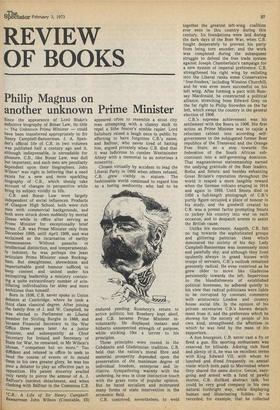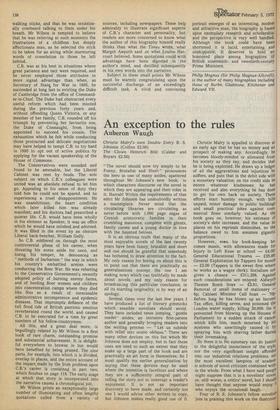Philip Magnus on another unknown Prime Minister
Since the appearance of Lord Blake's definitive biography of Bonar Law, its title --The Unknown Prime Minister — could have been transferred appropriately to Sir Henry Campbell-Bannerman. J. A. Spender's official life of C.B. in two volumes was published half a century ago and it, although indispensable, is unreadable for Pleasure. C.B., like Bonar Law, was dull but important, and such men are peculiarly dependent upon their biographers. John Wilson* was right in believing that a need exists for a new and more sparkling biography of C.B., which should take account of changes in perspective while bring its subject vividly to life.
C.B. and Bonar Law were largely independent of social influences. Products of Glasgow High School, both were • rich men with commercial backgrounds, and both were struck down suddenly by mortal Illness while in office after serving as Prime Minister for exceptionally brief terms. C.B. was Prime Minister only from December 1905, until April 1908, and was acclaimed as the incarnation of earthy commonsense. Without panache or intellectual distinction, and temperamentally indolent, he was perhaps the _least articulate Prime Minister since Rockingham. But straightness, shrewdness and imperturbable good humour sufficed to keep content and united under his Uninspiring leadership a ministry containing a quite extraordinary number of scintillating individualists far abler and more ambitious than himself.
Born in 1836, C.B. never spoke in Union debates at Cambridge, where he took a third class classical degree. After joining the family firm of J. and W. Campbell, he Was elected to Parliament as Liberal Member for Stirling Burghs in 1868, and became Financial Secretary to the War Office three years later. As a junior minister, and subsequently as Chief Secretary for Ireland and Secretary of State for War, he remained, in Mr Wilson's Phrase, "competent but no more." Too diffident and relaxed in office to seek to bend the course of events or to mould them to his own greater glory, he was too Poor a debater to play an effective part in oPposition. His patent sincerity availed Only rarely to pierce the armour of A. J. Balfour's insolent detachment, and when Clashing with Balfour in the Commons C.B.
*C.B.: A Life of Sir Henry CampbellBannerman John Wilson (Constable, £5) appeared often to resemble a stout city man attempting with a clumsy stick to repel a lithe fencer's nimble rapier. Lord Salisbury raised a laugh once in public by affecting to have forgotten C.B.'s name; and Balfour, who never tired of baiting him, argued privately when C.B. died that it was ludicrous to cumber Westminster Abbey with a memorial to so notorious a nonentity.
Chosen virtually by accident to lead the Liberal Party in 1899 when others refused, C.B. grew visibly in stature. The fashionable world continued to regard him as a boring mediocrity who had to be endured pending Rosebery's return to active politics; but Rosebery kept aloof, and C.B. became Prime Minister involuntarily. He displayed instant and hitherto unsuspected strength of purpose, while sticking like a terrier to his principles.
Those principles were rooted in the Cobdenite and Gladstonian tradition. C.B. held that the nation's moral fibre and material prosperity depended upon the preservation of the maximum degree of individual freedom, enterprise and initiative. Sympathising warmly with the underdog, he was in close instinctive touch with the grass roots of popular opinion. But he hated socialism and mistrusted many forms of state intervention in the economic field.
C.B. contrived, nevertheless, to weld together the greatest left-wing coalition ever seen in this country during this century. Its foundations were laid during the dark days of the Boer War, when C.B. fought desperately to prevent his party from being torn asunder; and the work was completed during the subsequent struggle to defend the free trade system against Joseph Chamberlain's campaign for a new system of imperial preference. C.B. strengthened his right wing by enlisting into the Liberal ranks some Conservative ' free-fooders,' including Winston Churchill; and he was even more successful on his left wing. After forming a pact with Ram say Macdonald, he constructed a political alliance, stretching from Edward Grey on the far right to Philip Snowden on the far left, which swept the country in the general election of 1906.
C.B.'s supreme achievement was his settlement with the Boers in 1906. His first action as Prime Minister was to cajole a reluctant cabinet into according selfgovernment to the subjugated former Boer republics of the Transvaal and the Orange Free State, as a step towards the federation of the South African sub continent into a self-governing dominion. That magnanimous statesmanship earned the undying gratitude of the Boer leaders, Botha and Smuts; and besides enhancing Great Britain's reputation throughout the world it reaped a more tangible reward when the German volcano erupted in 1914 and again in 1939. Until Smuts died in 1950 a full-length photograph of C.B.'s portly figure occupied a place of honour in his study, and the goodwill created by C.B. was a potent factor prompting Smuts to jockey his country into war on each occasion, and to despatch armies to assist the British cause.
Unlike his successor, Asquith, C.B. felt no tug towards the sophisticated groups and glittering patrician class which dominated the society of his day. Lady Campbell-Bannerman was immensely stout and painfully shy, and although they lived opulently always in grand houses with troops of servants, C.B.'s outlook remained genuinely radical. He even contrived as he grew older to move like Gladstone persistently towards the left. Impervious to the blandishments of established political hostesses, he adhered quietly to his view that radical politicians were liable to be corrupted by constant commerce with aristocratic London and country house social life. In the opinion of his private secretaries C.B.'s known detachment from it, and the preference which he showed for the society of people of his own kind, strengthened the affection in which' he was held by the mass of his supporters.
A bon bourgeois, C.B. never cast a fly or fired a gun. His sporting enthusiasm was reserved for billiards. Adoring rich food and plenty of it, he was on excellent terms with King Edward VII, with whom he lunched and dined frequently on annual visits which both paid to Marienbad where they shared the same doctor. Genial, easygoing and armed with a fund of pawky stories, C.B. disliked abstract talk, but could, be very good company in his own natural forthright way, while displaying human and illuminating foibles. It is recorded, for example, that he collected walking sticks, and that he was occasionally overheard talking to them under his breath. Mr Wilson is tempted to believe that he was relieving at such moments the frustrations of a childless but deeply affectionate man, as he selected the stick to be taken for an airing while murmuring words of consolation to those he left behind.
C.B. was at his best in situations where great patience and tact were required, and he never employed those attributes to more signal advantage than when, as Secretary of Stat% for War in 1895, he succeeded at long last in evicting the Duke of Cambridge from the office of Commander-in-Chief. The Duke had obstructed every useful reform which had been mooted during the previous forty years and, without offending Queen Victoria, or any member of her family, C.B. rounded off his triumph by preventing her favourite son, the Duke of Connaught, from being appointed to • succeed his cousin. The exhaustion which he felt while conducting those protracted and delicate negotiations may have helped to tempt C.B. to try hard in 1895 to opt out of active politics by applying for the vacant speakership of the House of Commons.
The Conservatives were sounded and found to be amenable, but the Liberal Cabinet was rent by feuds. The sole subject on which C.B.'s colleagues were united was an absolute refusal to let him go. Appealing to his sense of duty they told him he could not be spared, and he experienced a cruel disappointment. He was unambitious; the heart condition which later killed him was already manifest; and his doctors had prescribed a quieter life. C.B. would have been wholly in his element as Speaker; it was an office which he would have relished and adorned. It was filled in the event by an obscure Liberal back-bencher, William Gully.
So C.B. soldiered on through the most controversial phase of his career, when thrusting his notes aside for once, and losing his temper, he denounced as "methods of barbarism" the way in which his country's embattled armies were conducting the Boer War. He was referring to the Conservative Government's recently adopted policy of burning enemy farms, and of herding Boer women and children into concentration camps where they died like flies as a result of inexcusable administrative incompetence and epidemic diseases. That impromptu defiance of the full flood tide of British patriotic emotion reverberated round the world, and caused C.B. to be execrated for a time by great numbers of his fellow-countrymen.
All this, and a great deal more, is beguilingly related by Mr Wilson in a first book of rare charm, outstanding promise and substantial achievement. It is delightful everywhere to browse in but would have benefited by being pruned. The nine parts, for example, into which it is divided, overlap in places, and the entire account of the impact made by the Irish problem upon C.B.'s career is contained in part two, which finishes on page 118. The early stage at which that story is incorporated into the narrative causes a chronological jolt. Mr Wilson prints an exceptionally large number of illuminating and often lengthy quotations culled from a variety of sources, including newspapers. These help admirably to illustrate significant aspects of C.B.'s character and personality, but readers are more concerned to know what the author of this biography himself really thinks than what the Times wrote, what Margot Asquith said ,or what Loulou Harcourt believed. Some quotations could with advantage have been digested in the author's mind, and distilled subsequently in his own words into the narrative.
Subject to these small points Mr Wilson must be warmly congratulated upon the successful discharge of an exceedingly difficult task. A vivid and convincing portrait emerges of an interesting, modest and attractive.man; the biography is based upon exemplary research and scholarship; and the perspective is very well handled. Although the book could have been shortened it is lucid, entertaining and unskippable. It deserves to hold an honoured place among biographies of British nineteenthand twentieth-century Prime Ministers.
Philip Magnus (Sir Philip Magnus-Allcroft), is the author of many biographies including those of Burke, Gladstone, Kitchener and Edward VII.



































 Previous page
Previous page